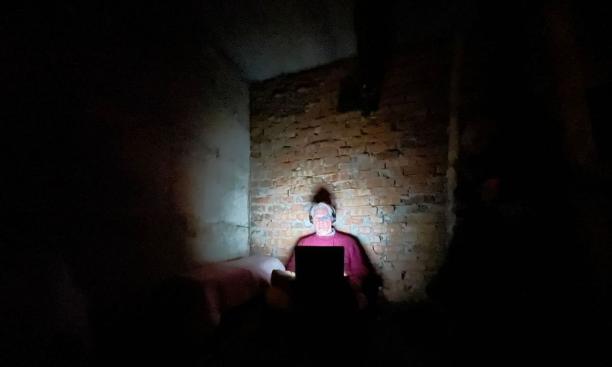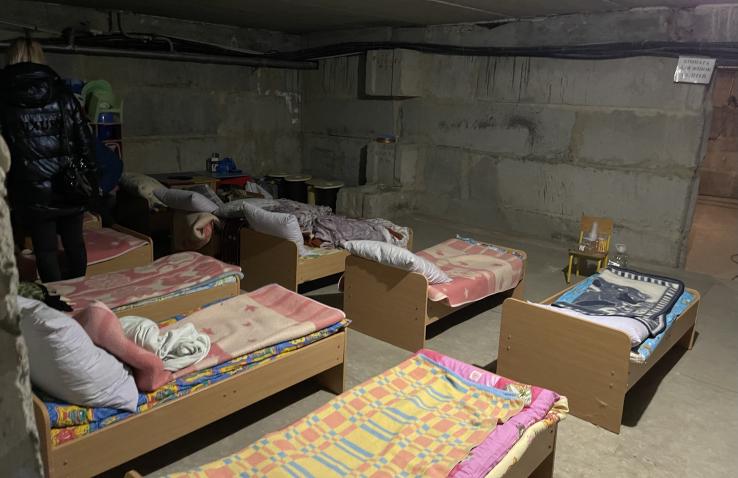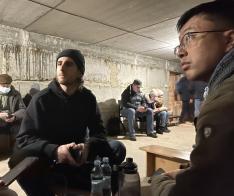
Journalist Frank Langfitt ’86 is NPR’s London correspondent, but for the past few weeks he’s been part of a team reporting in Ukraine. On Feb. 26, as the Russian army bore down on Kyiv, he spoke to PAW while traveling from the east toward the city of Lviv, near Ukraine’s western border. The trip covered hundreds of miles, and his team was in a car powered by liquid natural gas that couldn’t go far without refueling, so travel was going slowly.
He was with an NPR crew including Paris correspondent Eleanor Beardsley, Washington investigative reporter Tim Mak, two translator/fixers, and a few others.
Langfitt spoke over a poor cellphone connection, and at times he couldn’t be heard. This interview has been edited and condensed.
What are the roads like?
Heading out, the roads are packed — there are traffic jams miles and miles long. You’re seeing a country basically getting on a war footing. Up until a few days ago, most Ukrainians did not think this was going to happen, despite what the United States government intelligence was saying, and now as you drive west you see them building checkpoints, with big barriers. We passed one checkpoint where they had an earth mover and they were digging trenches for the soldiers. So things are really changing very rapidly. Almost all the fighting has been in the east, so where we are there hasn’t been much.
How are the Ukrainians reacting? What are they saying?
I think they are mostly in complete shock. I’ve been here for two and a half weeks, and when I got here, they said, “Well, we have been at war for eight years, we are used to this and until something happens, we don’t really believe it because so much of Vladimir Putin’s strategy is to terrorize the public.” And then a few nights ago the missiles began pouring into places — Kyiv, obviously, and places like Odessa, a number of other cities. Many [people] had not quite prepared for it. Some had. And so they’re coming around to the idea that their country faces a full-scale invasion by one of the major armies on the planet. That’s a lot to take in.
One thing I think is very interesting is there’s a real defiance. The world thinks that it’s outrageous that Russia is invading an independent, sovereign nation — a democratic nation — that has not provoked Russia at all. This is a completely unprovoked invasion to serve President Putin’s political purposes. And so one thing you’ve seen is the president, Volodymyr Zelenskyy, whose approval ratings were not that high before this happened, standing up and taking a very firm stance, saying the Ukrainians will not back down. You see many Ukrainians now going and getting weapons, getting ready to fight in the streets of Kyiv and elsewhere. It’s been quite something to watch.
I think it was just today or yesterday that the United States offered to evacuate President Zelenskyy, and he said, “I need ammunition, I don’t need a ride.” I was talking to civil defense people here and lots of people also downtown in the city of Kyiv, saying, “We need as much weaponry as possible to fight the Russians,” and they want it from NATO and from the United States. So that’s the big thing you hear, is, “give us more,” and they’d like a NATO no-fly zone.
The people on these roads with you, where are they going?
They’re mostly going straight to the Polish border. There are reports that at the Polish border waits can be up to 48 hours to get across. People are sleeping outside, which is probably what I will be doing in the next few days. I’ve been here for a few weeks, and we have other reporters who have come in to relieve us. So I will be making my way out through Poland.
It’s very tricky. We were looking at the map and we were thinking it’s actually faster to go to Moldova, and there I was on my phone, Googling something I never would have imagined: “Can an American citizen enter Moldova without a visa?” The answer is yes. But there are Russian troops in Transnistria. So we were very cautious, we didn’t want to end up running into a bunch of Russian troops.
Does your team have experience with conflict-zone reporting?
To varying degrees. Eleanor was here reporting in Ukraine when Russia was first backing separatists in the eastern part of the country. That’s been very valuable because she knows people from those trips. When I was based in Africa I used to work in Somalia and Mogadishu, covering the civil war there. I worked in South Sudan, also in Bahrain covering the Arab Spring uprisings. But this is very different. This is a ground war in Europe, which we hoped was a thing of the past.We think in Kyiv there will be an occupation. The Russians are in the process of surrounding Kyiv, and they’ll lay siege to it to try to topple the Ukrainian government. If that doesn’t work, the expectation is that they will put on the highest pressure they can. If you saw Vladimir Putin speak about Ukraine, he says it’s not even a country. He said they don’t have any rights or sovereignty, so we shouldn’t be surprised if he’s absolutely brutal on the people in these cities.
What do people think is going to happen?
I think that they are going to put up as tough a fight as they can possibly manage. They have a lot to fight for. This is their country. It’s been independent of the Soviet Union for some 30 years, it has its own national identity, it has its own culture. They don’t want to be a part of Russia.
This could also be a disaster for the Russian army, too, if they can’t topple the government. It’s going to be hard for them to subdue 41 million people, most of whom hate Vladimir Putin. So you could end up with a long insurgency here that could bloody the Russians and bog them down.
I have been very impressed with the Ukrainian people. They’re lovely to spend time with, they want peace. And now they’re fighting back. Yesterday morning we passed an old Soviet cultural center where there were all these men lining up to be divided into units. And they were going to go get their weapons and fight with the army. I’ve been seeing that, driving across Ukraine, going through small villages, the people lining up to join the army, to get their weapons and fight the Russians. It’s pretty incredible.
Is there anything else you’d like to include?
Yesterday we drove around part of Ukraine and through village after village, and we saw a lot. We ended up spending a lot of time in bomb shelters, because the sirens would go off for air raids. The strongest image I have that day was in the basement of a kindergarten being used as a bomb shelter. In one room they had set up all these little beds for the kindergarten students, so that they would have beds to sleep in during the Russian air raids. And to think this is Vladimir Putin’s policy, to terrorize kindergarteners. That’s what he’s doing.

Watch a video of Frank Langfitt ’86 in a bomb shelter in central Ukraine:

